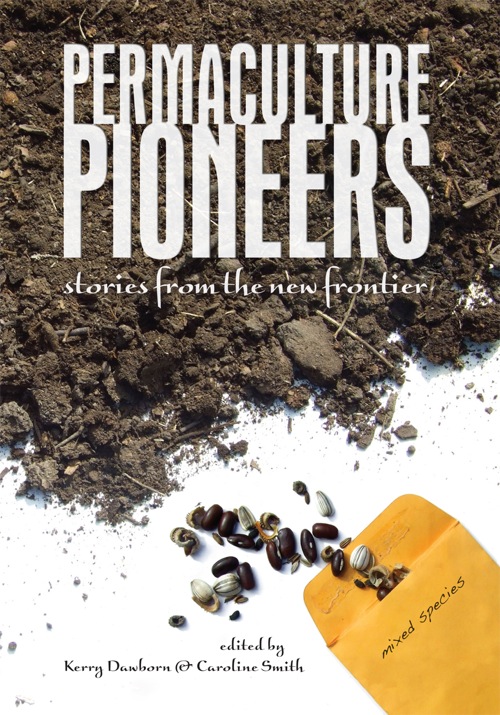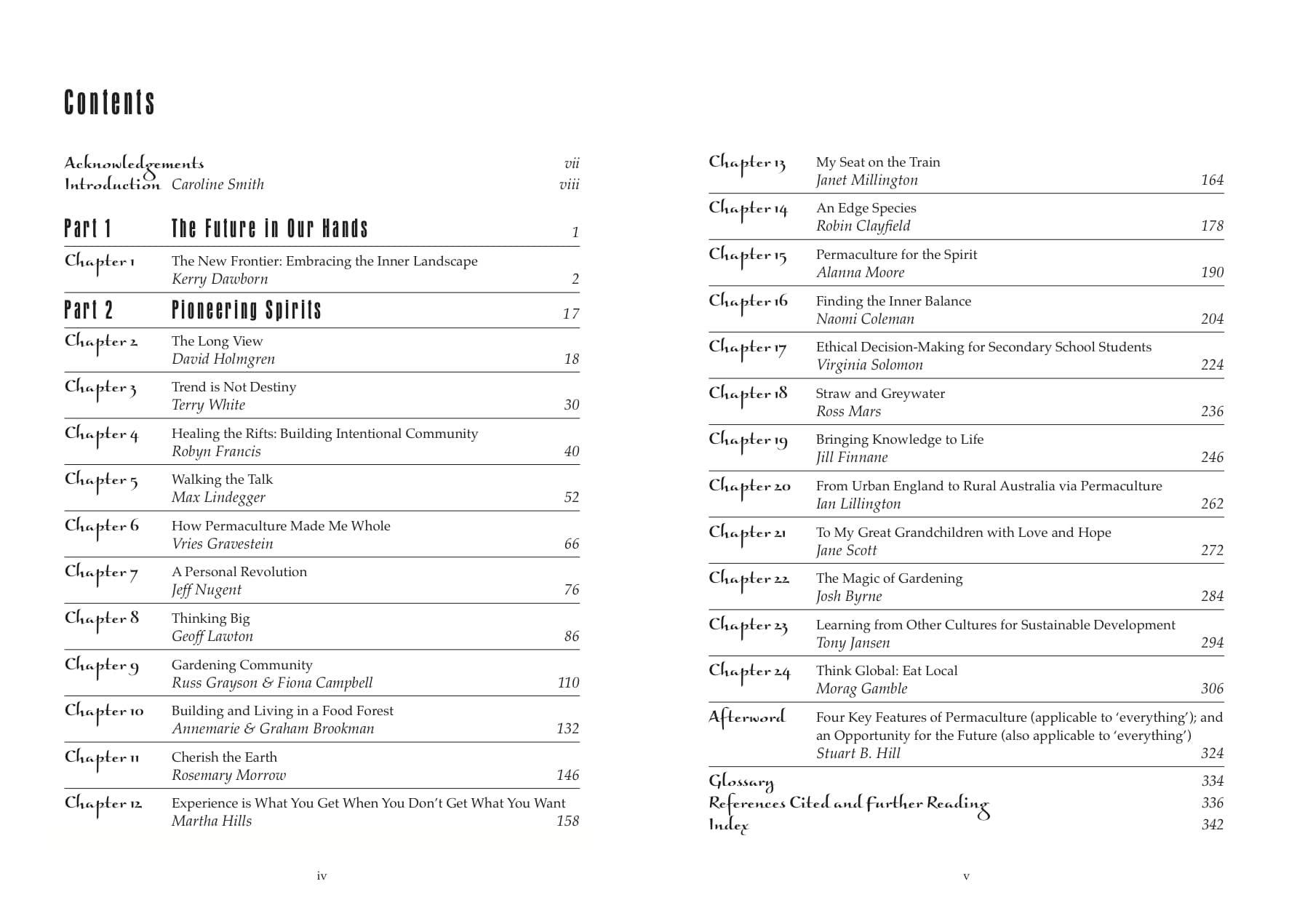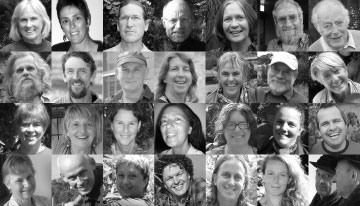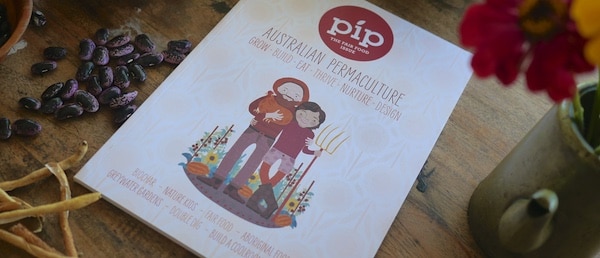Permaculture Pioneers: Book review - Milkwood: permaculture courses, skills + stories
Permaculture Pioneers: Book review
August 16, 2011 | Off-Farm goings on, Publications | 0 comments | Author :Kirsten Bradley

Permaculture Pioneers is a new book looking at the trajectory of permaculture in Australia from the 1970’s until right now. It’s an amazing and humbling read. And it’s launching in Sydney next week on August 25th, with David Holmgren presenting.
At the same event there will be the Sydney premiere of Anima Mundi, a new doco on the future of this planet of ours. Anima Mundi features Vandana Shiva, Noam Chomsky, the Melbourne Permablitz crew and many more thinkers and doers. Sounds like a good night to me!
The launch and film night is on at Chauvel Cinema in Paddington, Sydney on 25th August. The evening starts at 7pm with David Holmgrenpresenting Permaculture Pioneers, and is then followed by a screening of Anima Mundi, a new film by Peter Charles Downey.
If that’s not enough, the screening will be followed by Costa Georgiadispresenting a short shake-up on why Coal Seam Gas is everybody’s business (with risks like contaminating our entire continent’s ground water, for example), then it’s on to organic finger food, drinks, and discussion. Whew.
>> You can book tickets to this event here. I believe the organizers would be greatly relived if you pre-booked. All proceeds go to the Australian Youth Climate Coalition. I’ll see you there.
 Permaculture Pioneers: Table of contents: click to enlarge
Permaculture Pioneers: Table of contents: click to enlarge
Some of the contributors...
I think Permaculture Pioneers: stories from the new frontier is an important book for a couple of reasons.
This book gives us young-uns a sense of what has gone before. We all (Milkwood very much included) ‘stand on the shoulders of giants’ in all that we’re trying to do and achieve when it comes to permaculture and regenerative agriculture theory and practice.
And while we regularly honor the sources of the info and knowledge and skills we’ve been passed on, i like the solidity of this object, and it’s ability to un-smudge the origins of some ideas and parts of the permaculture movement.
The book is a kind of catalog of esteemed Australian permaculturists, each telling their stories in their own words. Many people we’ve had the honor to know, work and teach with are here (Bill Mollison, David Holmgren, Rowe Morrow, Geoff Lawton, Russ Grayson) and many MANY more besides.
While not every significant Australian permaculturalist of the last three decades is in here (Darren J Doherty didn’t get a look-in, for example), I don’t think this book is designed to be a definitive overview; rather it’s designed to give a sense of the depth and breadth of the Australian permaculture movement up to this point. And I think it does that very well.
For better or for worse, there seem to be some schools of learning within permaculture education that do not make a focus of ‘opening up’ students to the work of other teachers and doers as much as they could. Which is a shame, because diversity equals stability and abundance, in all things.
This could be partly due to how we access info these days – each online search leads you through a thread of links and inter-connected nodes, and before you know if you’re in a particular branch of the permaculture tree, so to speak. Some branches are more inter-connected than others.
I think this book is most important in that it joins dots and connects people you may not have known learned from, or alongside, each other. I would have liked to see a fabulous web-like map included in this book showing how each contributor related to each other, but maybe that’s a job for an enthusiastic reader (any takers?).
Who got inspired by who. Who worked where in relevance to when. Whose projects influenced which initiatives. Why we have the structures we have today. What has been lost. What has been found.
Reading this book brings back something we were talking to David Holmgren about in May, the subject for his talk at the dinner we held then in Sydney: the idea of ‘waves of permaculture’, like the waves that ripple through any movement, whether it be activism, literature or industry.
This book is an acknowledgement and an atlas of some of those waves and their side-ripples. It makes me proud to be part of something with so much thought, passion and intelligence gone before, and so much possible yet to come.
Buy Permaculture Pioneers from PermaculturePrinciples.com

As for Anima Mundi, I’m looking forward to seeing it. John Seed, one of the protagonists of the film and it’s Sydney showing in particular, is a very deep thinker.
Add to that the interviews with Vandana Shiva (alltime Milkwood hero), Noam Chomsky, Stephen Harding, the fab founders of Permablitz and even Michael Reynolds (Mr Earthship), and you have a lot of possibilities for goodness.
If you’re like me and a little shy of esoteric wrappings, I think maybe set that aside, and venture forth regardless with this one. It’s got some great contributors and we need more docos and an ongoing discussion around the possibility of ‘Earth as organism’, in my view.
All in all, I’m really looking forward to this one. Food Connect Sydney are doing the organic snacks, there will be info stalls with interesting groups, and no doubt plenty of firey and meaningful conversations to be had.
Hope to see you there, Sydneysiders. I’ll be there with bells on.
Facebook
Pinterest
Twitter
Gmail
E-mail
See the comments
Related Posts

The Fair Food edition of PIP Mag is out!The Fair Food edition of PiP Magazine is out, and it's a corker. . .
Read More

May all your carrots grow long and straight: a week with Joe[caption id="attachment_1539" align="aligncenter" width="500" cap . .
Read More

DIY urban bathtub aquaponics system
I think Permaculture Pioneers: stories from the new frontier is an important book for a couple of reasons.
This book gives us young-uns a sense of what has gone before. We all (Milkwood very much included) ‘stand on the shoulders of giants’ in all that we’re trying to do and achieve when it comes to permaculture and regenerative agriculture theory and practice.
And while we regularly honor the sources of the info and knowledge and skills we’ve been passed on, i like the solidity of this object, and it’s ability to un-smudge the origins of some ideas and parts of the permaculture movement.
The book is a kind of catalog of esteemed Australian permaculturists, each telling their stories in their own words. Many people we’ve had the honor to know, work and teach with are here (Bill Mollison, David Holmgren, Rowe Morrow, Geoff Lawton, Russ Grayson) and many MANY more besides.
While not every significant Australian permaculturalist of the last three decades is in here (Darren J Doherty didn’t get a look-in, for example), I don’t think this book is designed to be a definitive overview; rather it’s designed to give a sense of the depth and breadth of the Australian permaculture movement up to this point. And I think it does that very well.
For better or for worse, there seem to be some schools of learning within permaculture education that do not make a focus of ‘opening up’ students to the work of other teachers and doers as much as they could. Which is a shame, because diversity equals stability and abundance, in all things.
This could be partly due to how we access info these days – each online search leads you through a thread of links and inter-connected nodes, and before you know if you’re in a particular branch of the permaculture tree, so to speak. Some branches are more inter-connected than others.
I think this book is most important in that it joins dots and connects people you may not have known learned from, or alongside, each other. I would have liked to see a fabulous web-like map included in this book showing how each contributor related to each other, but maybe that’s a job for an enthusiastic reader (any takers?).
Who got inspired by who. Who worked where in relevance to when. Whose projects influenced which initiatives. Why we have the structures we have today. What has been lost. What has been found.
Reading this book brings back something we were talking to David Holmgren about in May, the subject for his talk at the dinner we held then in Sydney: the idea of ‘waves of permaculture’, like the waves that ripple through any movement, whether it be activism, literature or industry.
This book is an acknowledgement and an atlas of some of those waves and their side-ripples. It makes me proud to be part of something with so much thought, passion and intelligence gone before, and so much possible yet to come.
Buy Permaculture Pioneers from PermaculturePrinciples.com

As for Anima Mundi, I’m looking forward to seeing it. John Seed, one of the protagonists of the film and it’s Sydney showing in particular, is a very deep thinker.
Add to that the interviews with Vandana Shiva (alltime Milkwood hero), Noam Chomsky, Stephen Harding, the fab founders of Permablitz and even Michael Reynolds (Mr Earthship), and you have a lot of possibilities for goodness.
If you’re like me and a little shy of esoteric wrappings, I think maybe set that aside, and venture forth regardless with this one. It’s got some great contributors and we need more docos and an ongoing discussion around the possibility of ‘Earth as organism’, in my view.
All in all, I’m really looking forward to this one. Food Connect Sydney are doing the organic snacks, there will be info stalls with interesting groups, and no doubt plenty of firey and meaningful conversations to be had.
Hope to see you there, Sydneysiders. I’ll be there with bells on.
Gmail
See the comments
Related Posts

The Fair Food edition of PIP Mag is out!The Fair Food edition of PiP Magazine is out, and it's a corker. . .
Read More

May all your carrots grow long and straight: a week with Joe[caption id="attachment_1539" align="aligncenter" width="500" cap . .
Read More

DIY urban bathtub aquaponics system
Aquaponics just might be the ultimate closed-loop food production . .
Read More
Comments
5 responses to “Permaculture Pioneers: Book review”
 ronnie says:
ronnie says:
August 16, 2011 at 7:15 am
for anyone permy folk living on the south coast of NSW – David Holmgren will be at the South East Permaculture Convergence (which kicks off this saturday august 20 – http://scpa.org.au/pc.html) – and will be launching the book in bega on sunday august 21 ahead of the sydney launch (lucky us!) – the convergence promises to be a top event for anyone who has had an introduction to permaculture via the PDC or simply and intro weekend…. check out the details via the link and see all you south coast permies there!
 milkwoodkirsten says:
milkwoodkirsten says:
August 16, 2011 at 3:46 pm
Have fun down there, ronnie!
 permaculturetv says:
permaculturetv says:
August 16, 2011 at 1:56 pm
Two words really define the essence of permaculture; perennial polyculture, as a design system, a craft movement and as an institution. The inter-pollination and inter-mingling of all these pioneers during the various stages of the social changes are what have made it one of the most dynamic international grassroots sustainabiliy movements. Attempts to re-unify the many varieties of permaculture now, would be an imposition of a monoculture.
Three cheers for Costa, finally a permie who has the guts to follow-up on the idea, “that permaculture is more than a gardening system”. Following Bill’s lead on the Permaculture People’s Party idea at APC9, we all must realize that “positive solutions only” often require the full range of powers of citizenship. Permaculture and politics are not mutually exclusive, as I am sad to say, I expect the Transition Towns Totnes folks will discover as they inevitably are co-mingled with the Conservative Big Society.
 milkwoodkirsten says:
milkwoodkirsten says:
August 16, 2011 at 3:52 pm
Good points, ptv, tho I would say there are many, many permaculturalists that live and work by the premise that “permaculture is more than a gardening system” (not that Costa isn’t tops)…
after having spent 2 days in May watch David Holmgren teach our PDC students his permaculture principles with a focus on just about everything except gardening, I would say many are moving beyond that expectation these days?
yes, permaculture is political… always has been, and will be more so as we approach greater disruption and the need for alternative systems of thinking and doing to ensure a regenerative future…
Read More
Comments
5 responses to “Permaculture Pioneers: Book review”
August 16, 2011 at 7:15 am
for anyone permy folk living on the south coast of NSW – David Holmgren will be at the South East Permaculture Convergence (which kicks off this saturday august 20 – http://scpa.org.au/pc.html) – and will be launching the book in bega on sunday august 21 ahead of the sydney launch (lucky us!) – the convergence promises to be a top event for anyone who has had an introduction to permaculture via the PDC or simply and intro weekend…. check out the details via the link and see all you south coast permies there!
August 16, 2011 at 3:46 pm
Have fun down there, ronnie!
August 16, 2011 at 1:56 pm
Two words really define the essence of permaculture; perennial polyculture, as a design system, a craft movement and as an institution. The inter-pollination and inter-mingling of all these pioneers during the various stages of the social changes are what have made it one of the most dynamic international grassroots sustainabiliy movements. Attempts to re-unify the many varieties of permaculture now, would be an imposition of a monoculture.
Three cheers for Costa, finally a permie who has the guts to follow-up on the idea, “that permaculture is more than a gardening system”. Following Bill’s lead on the Permaculture People’s Party idea at APC9, we all must realize that “positive solutions only” often require the full range of powers of citizenship. Permaculture and politics are not mutually exclusive, as I am sad to say, I expect the Transition Towns Totnes folks will discover as they inevitably are co-mingled with the Conservative Big Society.
August 16, 2011 at 3:52 pm
Good points, ptv, tho I would say there are many, many permaculturalists that live and work by the premise that “permaculture is more than a gardening system” (not that Costa isn’t tops)…
after having spent 2 days in May watch David Holmgren teach our PDC students his permaculture principles with a focus on just about everything except gardening, I would say many are moving beyond that expectation these days?
yes, permaculture is political… always has been, and will be more so as we approach greater disruption and the need for alternative systems of thinking and doing to ensure a regenerative future…
